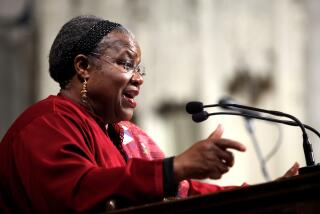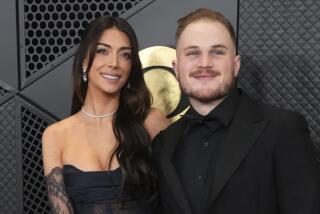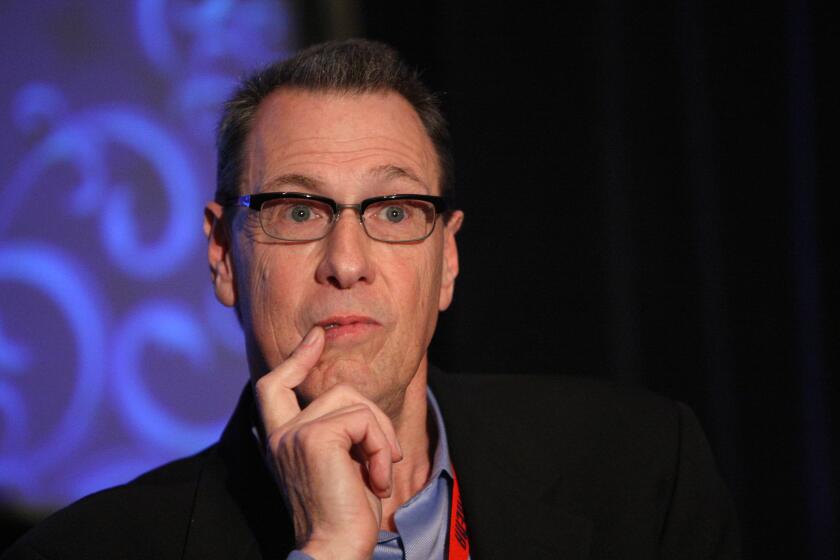Don’t Rap It--Whodini’s Gimmick Is Pure Sex
It’s not enough these days in the crowded sea of rap to be a young, black ghetto-refugee with a knack for raucous rhyme. To make waves, you need a gimmick.
Look at the Fat Boys. Being chubby food freaks sets them apart. Or take the Beastie Boys, who come on like gross, out-of-control frat boys. And, they’re white.
But what about Whodini, the Brooklyn trio about to blast off to stardom after years of languishing on the launching pad? Their fourth album, “Open Sesame,” rose to No. 38 on the Billboard sales chart in just three weeks. In case you’ve forgotten, this is the same group that had the misfortune to be on stage in the Long Beach Arena last year at the beginning of the riot that rap is still trying to live down.
So what’s Whodini’s gimmick?
“Sex,” replied the group’s cool, smug, fast-talking John (Ecstasy) Fletcher. “We’re the sex symbols of rock. We look sexy when we’re on stage. We turn people on. . . . Some of the songs we’ve done for the image haven’t been great. We won’t win any humanitarian awards for them.
“But they’re funny. You can’t take them too seriously. But we do them with good taste--as much as possible anyway. We don’t get down and dirty like some of these rappers.”
One of the “Open Sesame” songs, “I’m Def (Jump Back and Kiss Myself),” is typical of the material that plays to their sex-symbol image. A sample of the lyrics, co-written by Whodini’s chief writer and co-rapper Jalil Hutchins: Dark Gables in effect/and we demand respect. We’re the brown-skinned legends/the living Casanovas.
Modesty isn’t one of Whodini’s attributes.
The sex-symbol gimmick, Fletcher explained, merely filled a void. “Rap needed some sex symbols. There was really nobody out there making the girls go crazy. The girls might like L. L. (Cool J.) some, but I’m talking about a real , honest-to-God sex symbol . . . somebody who makes the ladies sit up and take notice. That’s us.”
Fletcher chuckled as he looked down at his outfit. He had come to breakfast in West Hollywood in plain pants, a tattered jeans jacket and no shirt.
“Let’s face it, I don’t look like a sex symbol in these rags,” he said. “But onstage we’re sexy.”
For emphasis, he said “sexy” in a deep, playful voice, stretching it out a few seconds.
Fletcher, 23, is married and has a baby and, unlike some sex symbols, he doesn’t hide his family. His wife and daughter even accompanied him to the restaurant, though they sat at a separate table during the interview.
“Rappers have families and babies too,” he said. “I’m proud of my family. People have this image of rappers being wild and crazy and chasing women. A lot of them are lunatics. But some are responsible people with kids--like me.”
Fletcher loves Los Angeles. He said he even prefers it to Queens, his current home, or Brooklyn, where he grew up.
Choosing his words carefully, so as not to anger Brooklynites, he noted: “Brooklyn is . . . well, interesting. I still go there and have a drink with my old buddies. A lot of the people I know have grown up and moved out of there--those are the ones who aren’t on drugs.
“Crack is a killer. It’s knocked a lot of them out of the box. I didn’t want to be around it. I go to Brooklyn in the daytime. But nighttime I’m out of there. Call me a snob, call me anything you want. But I’m not going to endanger my family.”
About his old hometown, he added, “If I had stayed there I’d be setting my family up for something tragic. But I don’t want to paint a totally dark picture. I have some good memories of Brooklyn. That’s where I learned to rap.”
Fletcher has been rapping since the late ‘70s. “I can’t sing,” he replied. “But I heard somebody rap one day and I said to myself, ‘I can do that.’ I rap in pitch. I try to be unique. I have my own style. I know some people say all rap sounds the same but there are many differences. People who say that don’t listen to rap carefully enough. If they listen to me they’ll know I’m unique.”
Rap was just a hobby for Fletcher until 1982, when he made a single, “Magic Wand,” an ode to a local radio deejay, Mr. Magic. Fletcher and Hutchins, originally members of rival rap groups, joined forces on that single and later added Drew (Grandmaster Dee) Carter, completing the Whodini lineup.
There was so much interest in ‘Magic Wand” and the follow-up single, “The Haunted House of Rock” that the group made its debut album, “Whodini,” in the fall of 1983 for Jive/Arista Records. But that was just run-of-the-mill rap. They’ve improved markedly since then. The big reason has been producer Larry Smith, who co-produced Run-D.M.C’s first album.
Smith has a strong commercial sense. He’s guided them to three hit albums. “Escape” (1984) sold more than 1 million copies and last year’s “Back in Black” is just a few thousand shy of a million. Based on early sales--450,000 in a few weeks--”Open Sesame” may be the biggest of all. But the previous albums sold primarily to hard-core rap fans. The new one, judging from its high pop-chart numbers, has much more mass appeal.
With surprising candor, Fletcher admitted he’s not crazy about all the songs on the new album, but he is enthusiastic about “Rock You Again (Again & Again),” a synthesis of rap and rock that could make people forget Run-D.M.C’s rap version of Aerosmith’s “Walk This Way.”
“That should be a single,” Fletcher said. “That may help put us over the top. Then we can be real stars. We should be stars. We’re good--real good. I don’t want to sound like a braggart. I’d rather have somebody else give us credit. But the truth is the truth.”
More to Read
The biggest entertainment stories
Get our big stories about Hollywood, film, television, music, arts, culture and more right in your inbox as soon as they publish.
You may occasionally receive promotional content from the Los Angeles Times.






